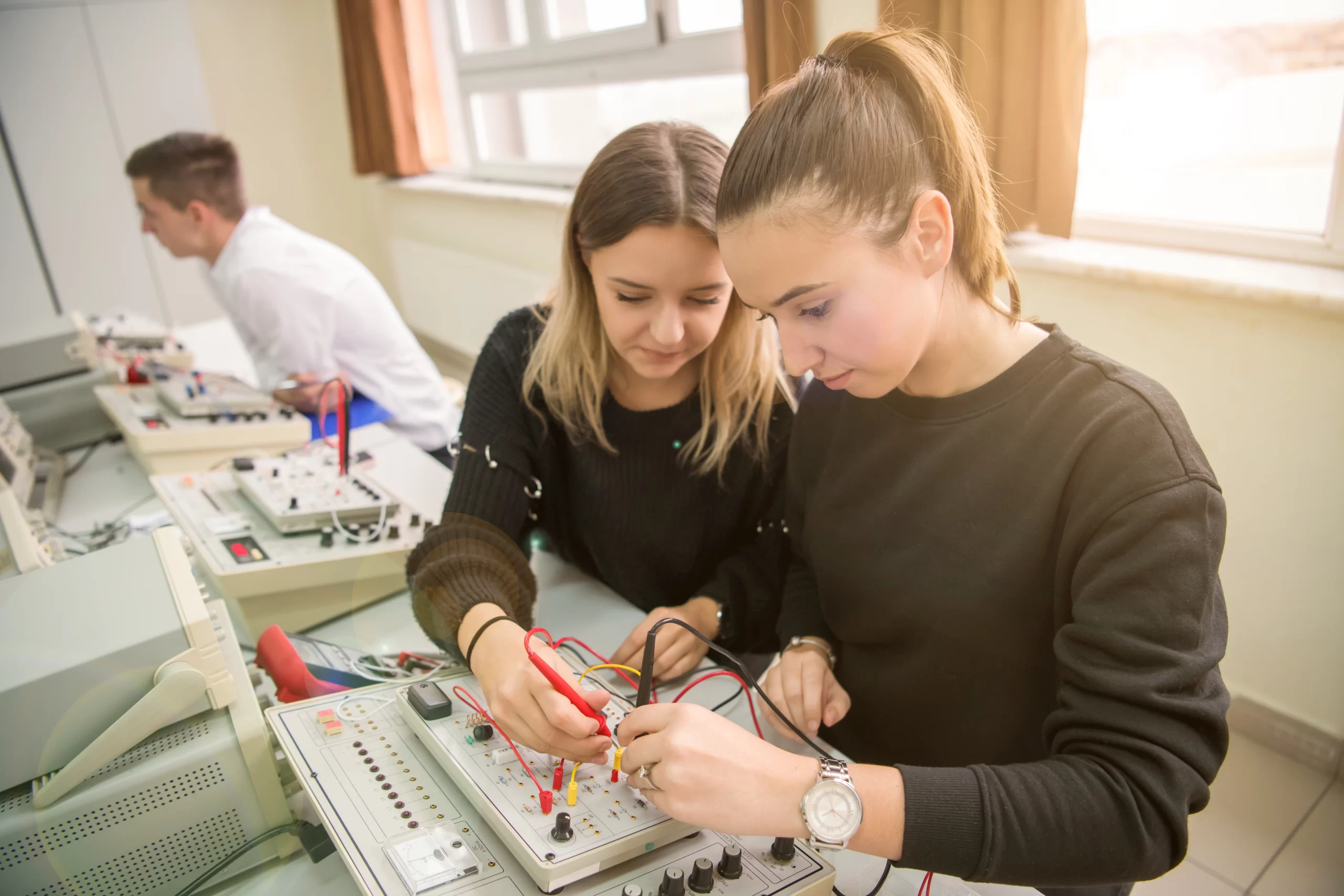There is no universally accepted international definition of the youth age group. While other definitions may be adopted by Member States, for statistical purposes the United Nations adopts the definition of young people as people between 15 and 24 years old – which represents 16% of the world's population.
This definition was established in the context of preparations for the International Year of Youth in 1985 and was endorsed by the General Assembly in 1981 through resolution 36/28. All UN statistics on youth are based on this definition and are reflected in yearbooks of statistics published by the UN system on demography, education, employment and health.
Projections indicate that by 2030, the deadline established for achieving the Sustainable Development Goals (SDGs) of the 2030 Agenda, this number should increase by 7%, reaching almost 1.3 billion young people.
As young people increasingly seek opportunities and fair, equitable and progressive solutions in society, the urgency to address the multifaceted challenges they face is more evident than ever. Issues such as access to education, health, employment and gender equality are crucial challenges they face today.
Young people have the potential to be a positive force for development, provided they have access to the knowledge and opportunities they need to thrive. In particular, it is critical that young people receive a quality education and develop the skills needed to productively contribute to the economy.
The United Nations youth agenda is guided by the World Program of Action for Youth. This program covers fifteen priority areas for youth and presents proposals for action in each of these areas. Adopted by the General Assembly in 1995, the Program of Action provides a policy framework and practical guidelines for national action and international support to improve the situation of young people around the world.
Under this premise, the quality of education plays a crucial role in the development and empowerment of young people. Sustainable Development Goal 4 (SDG 4) highlights the importance of inclusive and equitable quality education, as well as access to lifelong learning opportunities for all.
Ensuring access to quality education is essential for facilitating a successful transition into the labor market and achieving decent work, as well as being critical to the achievement of several other Sustainable Development Goals. Quality primary and secondary education must be complemented by accessible technical and tertiary education opportunities, providing young people with relevant skills for employment and entrepreneurship.
Technical education plays a crucial role in equipping young people with practical skills and specific knowledge to meet the demands of the ever-evolving job market. In addition, tertiary education, including higher education and vocational training, plays a key role in developing leaders and skilled professionals, driving innovation and economic growth.
Technical and vocational education plays a fundamental role in the training of young people and in the socioeconomic development of a country. Through this teaching modality, students acquire theoretical and practical knowledge focused on a specific field of professional activity, preparing themselves to enter the job market in a qualified manner.
Technical and vocational education offers young people the opportunity to acquire skills and practical skills in areas such as technology, engineering, health, agriculture, administration, among others. This training allows students to be able to perform specific functions and be valued by the productive sector.
One of the advantages of this type of education is its close connection with the job market. Technical and vocational education institutions are constantly updating their curricula and study programs to keep up with market demands and trends. This provides students with training aligned with the needs of companies and increases their chances of employability.
In addition, technical and vocational education also contributes to the economic and social development of a nation. By training trained and specialized professionals in various areas, the country strengthens its productive infrastructure, drives innovation and encourages entrepreneurship.
However, it is important to highlight that technical and vocational education must be valued and receive adequate investments. It is necessary to offer financial resources, quality infrastructure and specialized teacher training so that educational institutions can provide a technical education of excellence.
In addition, it is essential that there is a change in mentality in relation to technical education, overcoming prejudices and stigmas associated with this type of education. Technical and vocational education should not be seen as an inferior alternative to academic education, but rather as a valid and necessary option for the integral development of young people and the country as a whole.
To promote quality education, it is necessary to invest in educational infrastructure, adequate teaching materials, educational technology and teacher training. In addition, it is important to promote innovative and inclusive pedagogical practices that meet the individual needs of young people, encouraging active participation and critical thinking.
Young people face significant challenges when it comes to employment, with much higher unemployment rates compared to adults. The global youth unemployment rate reached 13% in 2017, and many young people end up working in low-paying, precarious or informal jobs.
During the three-year development process of the 2030 Agenda, young people played a key role, working together with Member States and civil society, including youth organizations, to define specific goals and objectives. As such, well-being, participation and empowerment are essential factors to drive sustainable development and peace around the world.
The United Nations Youth Program within the Department of Economic and Social Affairs (DESA) plays a key role as the focal point for youth issues at the United Nations. Its aim is to raise awareness of the global situation of young people, promote their rights and aspirations, and broaden their participation in decision-making as a means of achieving peace and development. DESA coordinates youth participation in the General Assembly and in the United Nations Economic and Social System (ECOSOC), where governments regularly include youth in their official delegations.
To further strengthen youth-related work, the Secretary-General appointed a Youth Envoy in January 2013 and a Special Envoy on Youth Unemployment in September 2016. These envoys work together to increase youth access to the Nations United, ensuring their voices are heard and their concerns addressed.
An important DESA initiative is the preparation of the World Youth Report, a biennial publication that highlights key areas in youth development. This report provides a comprehensive overview of the challenges faced by young people around the world, as well as opportunities and good practices that promote their development. It is an essential tool for informing youth-oriented policies and programs.
The ECOSOC Youth Forum is a flagship annual event that provides a platform for young people to express their needs and concerns through informal dialogue with other stakeholders, in particular Member States. This forum provides a valuable opportunity to explore ways to promote youth development at all levels. Representing the most institutionalized venue for youth participation in UN deliberations, the ECOSOC Youth Forum is an important vehicle for mobilizing youth support for the implementation of the 2030 Agenda and its Sustainable Development Goals.
The Role of Vocational Technical Education in the Formation of New Leaders and Entrepreneurs
Socio-educational guidance has become a relevant agenda in discussions about the expansion of secondary education. Although initially the tutoring function did not include vocational guidance, currently there are ongoing experiences, some in partnership with the International Labor Organization (ILO), which seek to promote a broader and socio-educational approach in guiding young people during the last segment of education secondary.
These initiatives aim to provide young people with tools so that they can build educational and professional strategies based on their interests and personal potential. In addition to traditional vocational guidance, these approaches seek to offer a better understanding of the socio-occupational context and post-secondary educational possibilities. In addition, they seek to establish relationships between the personal interests of young people, the various work options and the educational opportunities available. Information on workers' rights and duties is also provided, allowing young people to critically reflect on the world of work.
These initiatives are often led by NGOs that work in non-formal education and have developed interesting materials and approaches in this area. Through specific modules or workshops, these organizations seek to promote an environment that goes beyond mere vocational guidance, providing young people with the knowledge and skills necessary to make informed and strategic decisions regarding their education and career.
In Chile, the Chilecalifica Program has developed, among several lines of action, an approach aimed at vocational and professional guidance in secondary education. Since 2003, the program has launched calls for funding projects in secondary schools that seek to link their educational offer with available information on the job market and that propose to articulate with local strategic networks. In this sense, the objective is not only to develop courses for young people within the school environment, but also to promote the inclusion of the school in local networks. This experience is very interesting and there is information available on the internet about it.
In Colombia, there is also an interesting approach, with the introduction, at secondary level, of a broad module called “work culture”. However, there are still no evaluations available on this initiative. Another format is that of secondary education with an emphasis on training for work, which is similar to integrated training. This type of format is based on arguments related to the motivation of young people, the improvement of the performance of students with difficulties, the continuity of studies and the integration of theoretical, technological and practical knowledge. There is a debate about when this professional training should be introduced, especially in countries where secondary education is divided into two stages: lower and higher. It is discussed whether some vocational training content should already be introduced in lower secondary education, for young people aged 12 and 13.
Although there are few experiences that propose a policy oriented towards secondary education along with professional training, such as the Brasil Profissionalizado program in Brazil, there are some precedents, such as the network of Fé e Alegria schools and tele-secondary schools in Mexico (distance secondary education). ). They are diverse experiences, but still small, which have the perspective of introducing professional training articulated with general secondary education. These initiatives face several challenges, such as ensuring the quality of professional training, integrating it institutionally and curricularly, dealing with issues of funding, equipment, materials, curriculum integration, professional profiles and teacher training.
These issues are being discussed in international surveys, taking into account the shortness of professional training and existing institutional conditions. Some African countries, for example, have critically evaluated the feasibility of such training, considering its quality to be questionable. In addition, there are a number of other challenges related to funding, equipment, materials, curriculum integration, professional profiles and teacher training that need to be addressed to ensure the success of these initiatives.
It is observed that there are two approaches to the development of entrepreneurial skills among young people. One of them occurs through productive school projects, which aim at the development of enterprises. The other approach seeks to promote an entrepreneurial attitude in young people, without necessarily being limited to commercial entrepreneurship, encouraging them to undertake social and citizen projects. There are several propositions and documents on work methodologies in this area through the International Labor Organization (ILO) and the Organization of Ibero-American States (OEI).
In general, entrepreneurial training is carried out through two main strategies: business simulation and the development of concrete cases. In Colombia, for example, there is a cross-curricular subject on entrepreneurship at all levels of education, while the Province of Rio Negro, in Argentina, also develops the subject on entrepreneurship. However, some issues are pointed out by the studies, such as the lack of synchrony with local development, the teachers' objectives and the need to create institutional commissions to implement these approaches.
In addition, some initiatives are carried out outside the school environment, with the participation of other actors, and schools may resist these approaches because they do not understand the need to develop them, in addition to representing an overload of work. In projects more directly related to production, there is constant tension between the productive logic and the educational logic. An important issue in all internship experiences and productive projects is ensuring the participation of all young people.
There are also several pedagogical strategies ranging from practice to theory, as well as projects that propose active learning in real contexts. These trends indicate a reformulation of the role of preparation for work in secondary education, aiming to overcome the dichotomy between general and specific knowledge, include the community in the school, consider cultural diversity, motivation and interests of young people, in addition to recognizing inequalities and living conditions of families.
These trends are materialized in initiatives such as the explicit introduction of work knowledge in general laws of education or secondary education, as is the case in Mexico, Colombia and Brazil. Specific laws or decrees are also enacted to organize and protect the pedagogical objectives of devices such as internships. In addition, there are specific financing projects, such as Brasil Profissionalizado, and guidelines offered to schools to develop these projects.
The UN, in order to combat violence in communities in Haiti, is investing in vocational technical education programs. In historically dangerous areas of the Port-au-Prince region, the country's capital, young people are being trained to engage in entrepreneurial activities.
Among the careers offered are classes in plumbing, civil construction, metallurgy and other relevant areas. Each training cycle serves approximately 200 people, with a minimum participation of 30% of women. In addition, all participants receive financial aid to secure round-trip transportation.
Sine Laubens, 20, is one of the beneficiaries of the program. He has four unemployed siblings and is taking air conditioning maintenance classes. In addition, the program sponsored by the United Nations Stabilization Mission in Haiti (MINUSTAH) offers him a six-month internship at a specialized company. Sine believes that the course can significantly change her life.
According to the MINUSTAH section that deals with Reducing Violence in Communities, the project seeks to offer training in areas that allow young people to work independently, since the country faces a high unemployment rate.
In addition to technical classes, participants receive instruction in basic literacy, notions of calculus and are artistically stimulated. Psychosocial support and awareness-raising activities are also provided to reduce violence against women.
Around the world, several actions have been developed to strengthen and promote technical and vocational education as a relevant and quality educational option. Governments, international organizations, educational institutions and companies are engaged in initiatives that aim to prepare young people for the job market, equipping them with practical skills and specialized knowledge.
A notable example is the experience of Germany, known for its dual system of vocational education. In this model, students alternate between theoretical classes at educational institutions and practical training at companies. This approach allows students to acquire job-specific skills while being in direct contact with the professional environment, facilitating their transition into the job market.
Another country that has invested heavily in technical education is Switzerland. The Swiss vocational training system is highly recognized and valued, providing students with a balanced education between theory and practice. Through partnerships between schools and companies, students are exposed to different areas of work and have the opportunity to apply their knowledge in real situations.
In Brazil, the “Brasil Profissionalizado” program aims to strengthen and expand professional and technological education in the country. Through partnerships between the federal government, the states and educational institutions, technical courses are offered that are integrated into secondary education, enabling young people to obtain a broad and qualified education.
The International Labor Organization (ILO) has also played an important role in promoting technical and vocational education in several countries. Through projects and programs, the ILO supports the improvement of the quality of professional education, the training of teachers and the promotion of partnerships between educational institutions and the productive sector.
In addition, several companies have assumed the responsibility of promoting technical and professional education. They establish partnerships with schools and educational institutions, offer internship and apprenticeship programs, and invest in infrastructure and equipment to ensure quality training for young people.
These actions demonstrate the growing importance of technical and vocational education as a way for the personal and professional development of young people. Through these initiatives, students have the opportunity to acquire practical skills, gain specialized knowledge and be prepared for the demands of the job market.
How Industry 4.0 is Changing the Profile of Technical Professionals
Industry 4.0, also known as the Fourth Industrial Revolution, is bringing major changes to the industrial sector across the world. With the adoption of new technologies such as the Internet of Things (IoT), artificial intelligence (AI), advanced robotics and process automation, the industry is becoming increasingly connected, intelligent and efficient. These changes are impacting not only industrial processes, but also the profile of technical professionals.
One of the main changes is the need for professionals with specialized technical skills to operate and manage new technologies. Industry 4.0 is focused on a new set of technical skills, including knowledge in programming, automation, data analysis and maintenance of complex systems.
In addition, Industry 4.0 is increasing the demand for professionals with interpersonal skills such as teamwork, communication and leadership. With the adoption of new technologies, companies are looking for professionals who can work on equipping processes to implement innovative solutions and manage complexes. Leadership and communication skills are also essential to coordinate multidisciplinary teams and ensure that everyone involved is aware of the project's objectives.
Another important change is a need for professionals with multidisciplinary training. Industry 4.0 is focused on professionals who can integrate knowledge from different areas, such as engineering, information technology, data science and business management. This multidisciplinary training is essential to understand the complexity between industrial systems and processes and ensure that integrated solutions are efficient and effective.
Businesses also play a crucial role in this new era of technical work. They must invest in education and training programs, collaborate with educational institutions and promote a work environment that encourages innovation and continuous learning. In addition, it is important that there is greater emphasis on forming partnerships between industry, academia and government, with a view to adapting educational curricula to the demands of the labor market.
The new era of technical work brings with it challenges, but it also opens the door to a series of opportunities. Industry 4.0 is transforming the way the industry operates, and the professionals who adapt to this new reality will play a fundamental role in the conduct and success of organizations. Technical qualification combined with transversal skills and an attitude of continuous learning are the bases for success in this era of technological transformation.
In view of this, professional education plays a fundamental role in the formation of qualified labor to meet the demands of the productive sector in constant evolution. However, in Brazil, the gap left by secondary education is visible, which is reflected in the low adherence of young people to technical education. Only 11% of them opt for this modality, while 83% do not go to university.
In this way, Unesco highlights the importance of investing in technical training, which meets the expectations of a significant portion of young people who do not necessarily seek the job market. She points out that the academic environment does not necessarily guarantee good jobs, attractive wages, financial stability and social ascension nowadays.
To expand technical education in the country, Otero defends the integration of the public and private sectors, through partnerships between the federal government, state governments and industry. She emphasizes the importance of a prior mapping of the areas of the labor market that most demand professionals trained in technical education, inverting the current logic and meeting the specific demands of each region, such as the agricultural sector in certain locations.
Therefore, it reinforces the urgency of investment in technical education, which requires in-depth knowledge in innovation, entrepreneurship, cognitive computing, problem solving and new business culture. In addition, the importance of improvements in the academic sector is highlighted, with Brazilian universities improving the training process and establishing stronger partnerships with industries.
A relevant initiative to encourage professional education in Brazil is the Knowledge Olympics, promoted by Senai, which is the main competition in the sector in the Americas. At this biennial event, experts and industry leaders come together to discuss the education paths of the future. Simon Schwartzman, from the Institute for Studies on Work and Society (Iets), points out that poor management, failures in teacher training and the prioritization of a classic model of education are some of the challenges to be faced in order to achieve the universalization of education for quality in the country.
The National Service for Industrial Learning (Senai) is recognized as an institution of excellence in training professionals for the industry.
One of Senai's distinctive features is its methodology recognized by the Organization for Economic Cooperation and Development (OECD). Through this methodology, Senai is able to identify the professions and skills needed for the next 5 to 10 years, providing students with training in line with the demands of the job market. Every four years, it draws up the Industrial Work Map, which maps the areas that will most require professionals in each state of the country, providing a basis for offering courses and developing curricula.
Despite facing a modest number of enrollments, Brazil stands out in international competitions in the area of professional education. At WorldSkills, an international Olympics for technical professions with the participation of around 60 countries, the Senai team won first place in the 2015 edition and third place in 2019.
Currently, industry plays a key role in the Brazilian economy, accounting for 21% of the country's Gross Domestic Product (GDP) and 20.4% of formal jobs. The future of the sector is promising, and Target 11 of the National Education Plan establishes the need to create 5.22 million vacancies in secondary technical professional education by 2024, with at least 50% of them in the public sector. However, in 2019, only 1.87 million registrations were registered, with only 14.5% in the public network.
Senai is dedicated to training the professionals of the future, combining theoretical and practical activities, in addition to providing direct experiences with companies. This approach, which combines knowledge and practice, has led to employability rates of up to 85% among graduates. Industry, as well as education, is undergoing an accelerated process of transformation and, more and more, demands trained professionals to work with new technologies and keep up with market changes. Therefore, it is important to boost the development of Brazilian – as well as global – industry and prepare students to face the challenges of the future.




